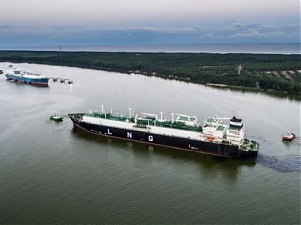Energy, EU – Baltic States, Gas, Lithuania, Port, Transport
International Internet Magazine. Baltic States news & analytics
Wednesday, 24.12.2025, 10:39
Will LNG vessel leave Klaipeda?
 Print version
Print version |
|---|
Experts
believe that the demand for gas, albeit decreasing, will remain strong enough
for Lithuania to maintain LNG infrastructure. They say that planned gas
interconnections between Lithuania and Poland and between Estonia and Finland
will provide an alternative route of supply, but will not completely replace
the terminal.
Romas Svedas, a former Lithuanian deputy energy minister, says that despite
expectations that renewable energy will replace fossil fuels, the energy sector
is changing slowly.
The energy expert notes that, based on the
International Energy Agency's forecasts until 2040, gas consumption will grow
worldwide and gas will overtake oil as the primary fuel in the European Union.
"Loud statements and discoveries in the field of
renewing energy should not deceive us into believing that this is really very
progressive, modern and fashionable. On the other hand, it is a fact of life
that we must ensure the supply of energy to industry," he said.
The Baltic gas market is set to change once planned
major infrastructure projects are carried out. Gas Interconnector
Poland-Lithuania (GIPL), slated to be completed in 2021, will connect
Lithuania, Latvia and Estonia to Poland and open access to Western European
markets. The Baltic Connector is expected to link Estonia to Finland in 2020.
However, Reinis Aboltins, a Latvian energy
expert, says that these projects are unlikely to make the LNG terminal
redundant.
"I really don't see how the Klaipeda LNG terminal
can lose its importance, because LNG production will remain competitive
globally. Let me quote Mark Twain who said that 'the reports of my death are
greatly exaggerated'," he told BNS.
However, Linas Balsys, a lawmaker and the chairman
of the Lithuanian Greens Party, doubts if the country will need the LNG
terminal in the future as he expects renewable energy to displace conventional
technologies.
"We have invested a great deal in the LNG
terminal. This creates problems, because if you invest in something, it has to
do something and work. We are unlikely to stop using gas so soon, but the thing
is that since we have LNG, in which a lot of money has been invested, we are
obliged by law to buy and consumer that gas," he told BNS.
According to Balsys, the likely growth in renewable energy
after 2024 and the emergence of an alternative gas supply route via Poland
makes the outlook for the LNG terminal vague.
After Lithuania failed to persuade Latvia and Estonia
to jointly apply for EU support, the government has to decide whether or not to
purchase the FSRU after the lease contract expires. Energy Minister Zygimantas Vaiciunas says that "we have to be sure that such a facility would be
needed after 2024 before mapping out possible scenarios".








 «The Baltic Course» Is Sold and Stays in Business!
«The Baltic Course» Is Sold and Stays in Business!

